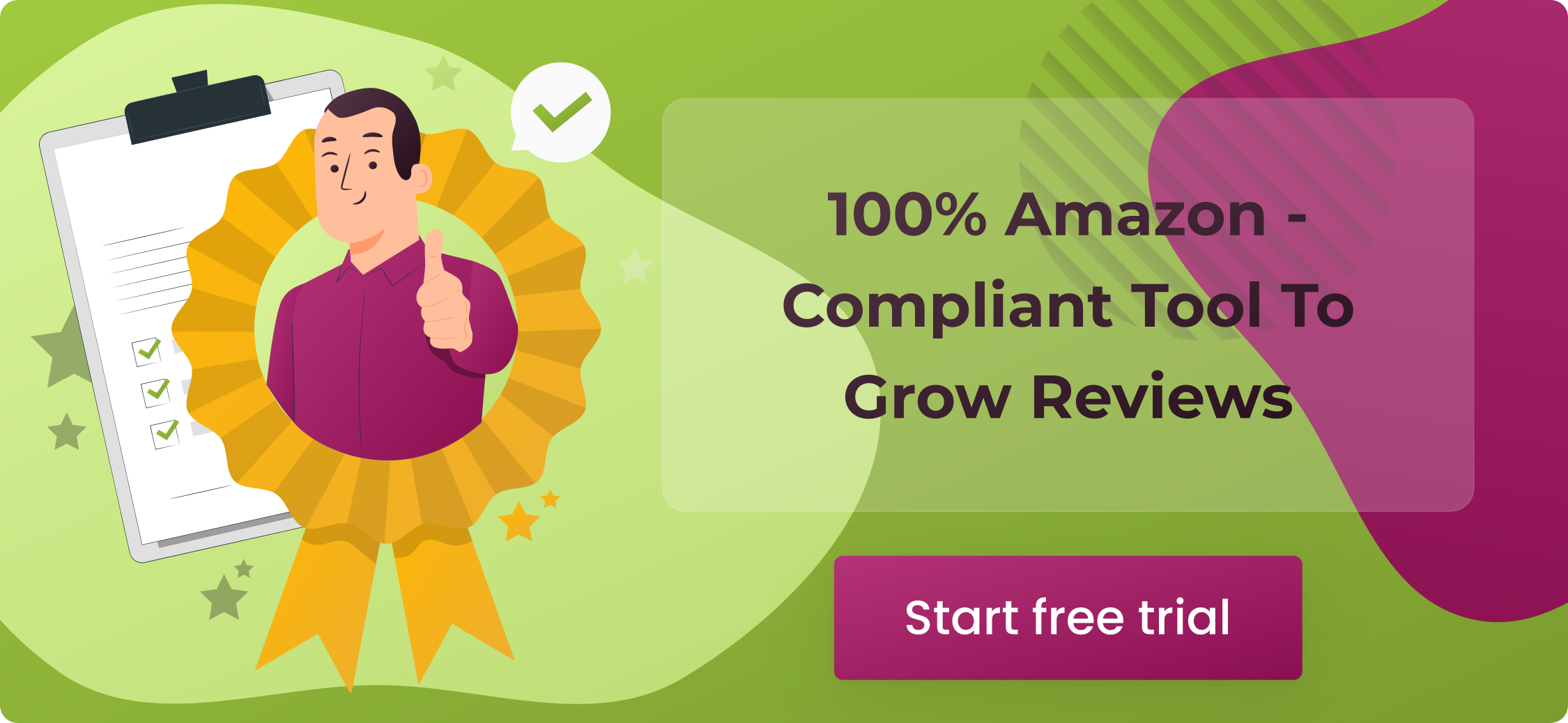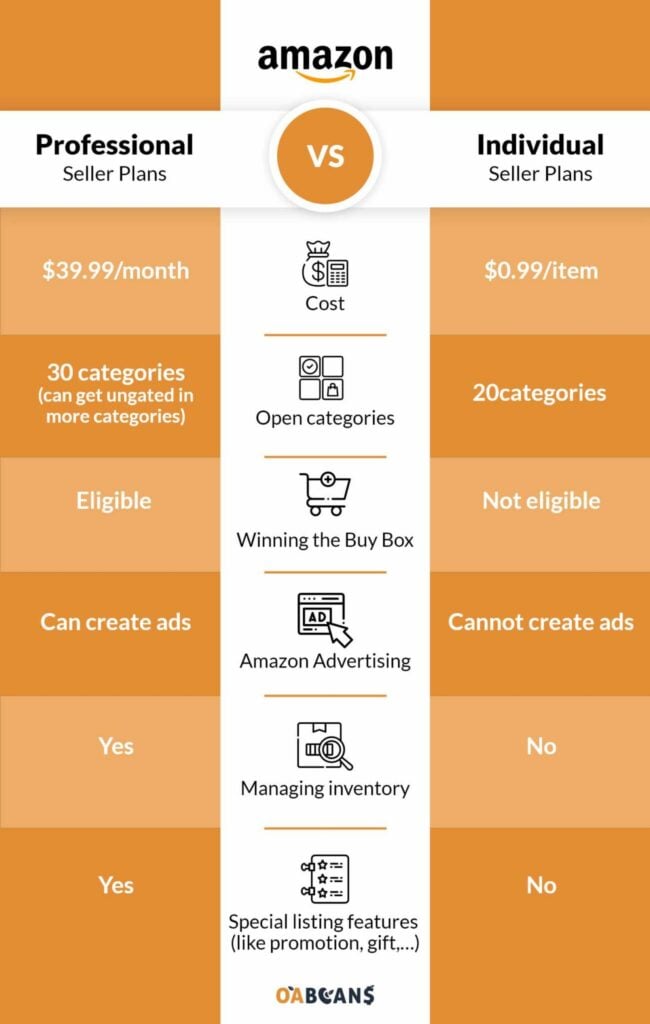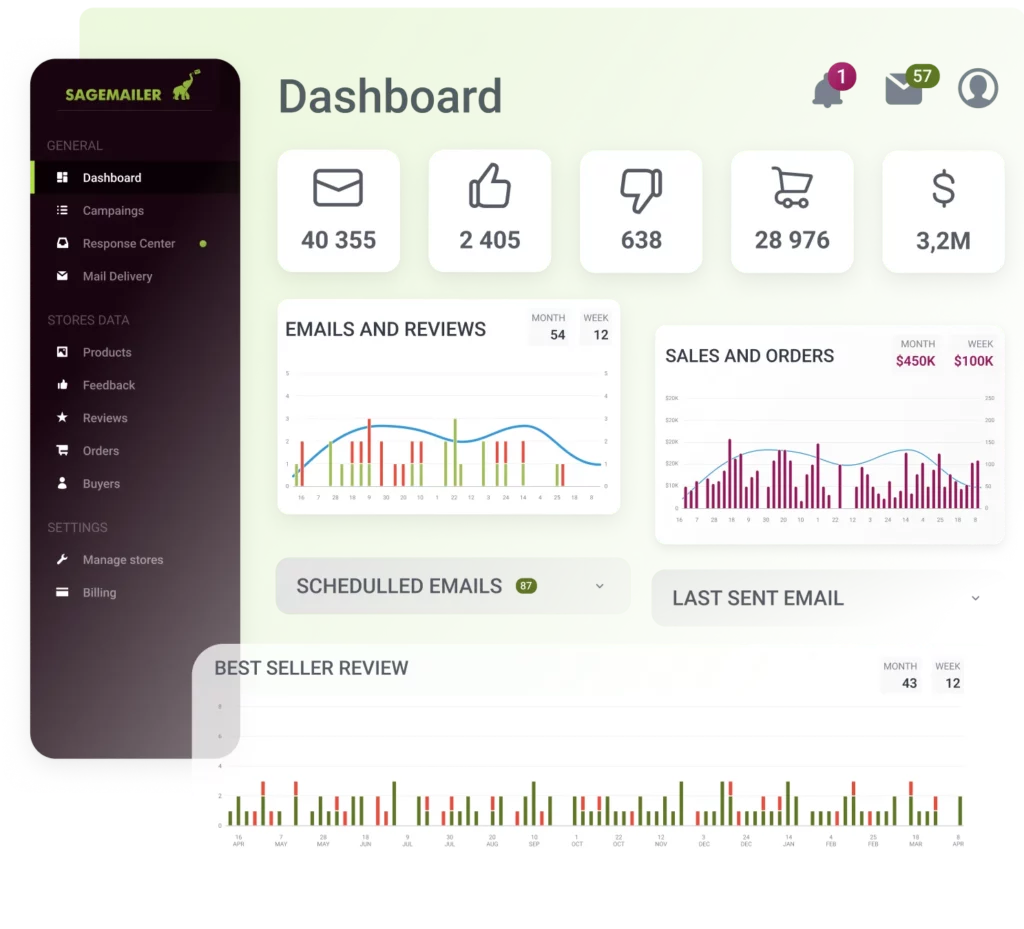Table of Contents
If you are planning on selling products on Amazon, then it is worth knowing about the different types of Amazon seller accounts and the process of an Amazon Seller Central account setup. There are individual, professional, and some other types of Amazon accounts that you should be aware of.

Individual Seller Account
- This is a free account. Each sale attracts a $0.99 fee.
- Suited for those barely selling any products (under 40 per month)
- Not ideal for those who want to use Amazon FBA at some point.
- Not ideal for those who are planning to run their business long-term.
- No promotional tools (e.g. no securing the Buy Box)
Basically, you should only be opting for an individual seller account if you are not running a business. While businesses that are selling fewer products may see some merit in the free seller’s account, you will be sacrificing certain tools that can make earning money on the platform a little bit easier for you.
Benefits and limitations of an Individual seller account
When it comes to different types of Amazon accounts, this is probably the most popular. It is completely free to register an individual seller profile on Amazon. You can also list an unlimited number of products, although this isn’t 100% recommended. If you are the type of person who doesn’t ship more than 40 products per month, then you are one of the types of sellers on Amazon that would probably benefit the most from having an individual account.
For the most part, the product listing features with an individual seller account on Amazon are the same as any other one of the Amazon seller account types. There may be a few limitations here and there, but these limitations won’t ever really be at the point where they can severely hamper your business. As we said; you really do have the opportunity to list an unlimited number of products on the marketplace.
While businesses can register as individual sellers on the platform, and it would be completely free of charge, it is not going to be recommended for most companies. This is because while there are no fees for signing up to an individual seller account, there will be additional fees when you sell a product. Additionally, understanding how to manage amazon customer reviews can be crucial for maintaining a positive seller profile.
Amazon charges $0.99 per sale with this type. This is on top of their standard fees for selling (known as referral fees). This means that they are fine up to a certain point. However, if you are running a business, the $0.99 fee will start to stack up rather quickly. In fact, if you are planning to sell more than 40 products per month, as most businesses should, then you should opt for the professional seller profile.
Professional seller account
- Costs $39.99 per month. No $0.99 fee on sales. You only pay the referral fee.
- Ideal for businesses with large product offerings. You will save money if you sell more than 40 products per month.
- Ideal for those who want to use Amazon FBA
- Promotional tools allow you to boost sales
- Better inventory management
If you are planning to run an Amazon business and want to make a decent number of sales on the platform over the course of many, many years then a professional seller account is going to be the best option for you.
Benefits and limitations of a Professional seller account
If you are looking for a business type of Amazon seller account, then the professional account is what you need. Do bear in mind that there is a monthly cost to the professional seller account. This will be $39.99 per month. Amazon has had it set at this price for a while, so we doubt that it is going to change any time soon.
Thankfully, that $39.99 per month is going to come with a few benefits over the individual account. These benefits will make it a bit easier to make huge numbers of sales on Amazon. However, the main benefit is the fact that with this type of seller profile on AMZ, you do not have to worry about paying that $0.99 per item sold fee. This is why this is the type you should opt for if you are planning to sell more than 40 products in any given month. Do bear in mind that if you sell below 40 products, you will still be charged that $39.99. However, for many, this is going to be fine. The professional seller profile isn’t too expensive and it does give a few more features for boosting sales.
For starters, with a professional account, you have a lot more control over the management of your inventory. You also have the ability to generate reports, something that an individual seller account is unable to do. This can make it a little bit easier for you to work out which products are selling and which ones are not. Basically, you can come up with a more ‘focused’ business strategy. Only professional accounts will be able to collect sales tax too. Only professional accounts will have the ability to set their own shipping rates too.
It is worth noting that some of the more popular categories on Amazon are restricted to professional seller accounts only. So, if you wanted to list products in the DVD or video game category, for example, then you would need to have a professional seller account. In fact, all of the major categories require an Amazon professional seller account, partly to help to keep competition down to a minimum for Amazon.
Besides, be sure to optimize your products by using Manufacturer’s Part Number. Apart from the better discoverability of goods, it enables online media such as Instagram or Facebook to show ads for items related to the customer’s search.
The main benefits, however, come from the promotional tools that you have available to you when you opt for a professional seller profile.
As you may well know; one of the main ways that you can boost the number of sales that you generate through Amazon comes from obtaining the buy-box. Once you have this, the number of sales that you do will shoot up. You are only able to have control of that Buy Box if you have a professional seller account. So, even if you are selling under 40 products per month, it may be worth opting for this type simply because of the long-term benefits you can enjoy from scoring that buy box.
Finally, only professional accounts can run promotions on Amazon. While this may not be something that you will want to do all that often, it is good to have the ability to run promotions when sales are running a little bit low.
Requirements and Fees
| Factor | Individual Seller Account | Professional Seller Account |
| Business Information | Basic personal information and bank account details are required. | Additional business information such as a registered business name, address, and credit card details are required. |
| Monthly Subscription | None | $39.99 per month |
| Per-Item Selling Fee | Yes | No |
| Referral Fees | Applies based on the product category. | Applies based on the product category. Professional sellers are also subject to referral fees, but not per-item fees. |
| Maximum Items Per Month | Up to 40 items per month | Unlimited |
For sellers with a limited inventory or those just starting out, the individual account offers a cost-effective option with no monthly subscription fee. However, as sales volume increases, the per-item fees can become a significant factor, making the professional account a more cost-efficient choice in the long run.
Moreover, the professional profile necessitates additional business information and a monthly subscription fee, indicating a higher level of commitment and legitimacy. It can instill trust among customers and may be preferable for sellers looking to establish a reputable brand presence on Amazon.
Differentiating Factors
The detailed comparison below can assist sellers in making an informed decision about which Amazon seller account best suits their needs and goals.
| Factor | Individual Account | Professional Account |
| Maximum Items Per Month | Up to 40 items per month. Sellers exceeding this limit may upgrade to a professional account. | Unlimited. Professional sellers can list an unlimited number of products without restriction. |
| Advanced Selling Tools | Limited access to selling tools and analytics. | Full access to advanced selling tools, including bulk listing, inventory management, and performance analytics. |
| Buy Box Eligibility | Not eligible. Individual sellers do not qualify for the Buy Box, reducing visibility and potential sales. | Eligible. Professional sellers can compete for the Buy Box, enhancing visibility and increasing sales opportunities. |
- Scalability: The professional type provides unlimited listing capabilities, making it ideal for sellers with large inventories or ambitious growth plans. The absence of monthly limits allows sellers to scale their operations without constraints, ultimately maximizing sales potential.
- Advanced Tools and Analytics: Professional sellers benefit from access to advanced selling tools and analytics, empowering them to optimize their strategies, track performance, and make data-driven decisions. These tools can be instrumental in driving growth and staying competitive in the marketplace.
- Visibility and Sales Potential: Eligibility for the Buy Box is a significant advantage for professional sellers, as it can significantly boost visibility and increase sales opportunities. While individual sellers may struggle to compete for this coveted spot, professional sellers have a higher chance of capturing consumer attention and driving conversions.
Fulfillment by Amazon – FBA
This isn’t technically an account type on AMZ, but a lot of people regard it as separate, so we figured we would mention it. We do want to point out that you can use Amazon FBA with either an individual or a professional account. However, the individual type lacks a lot of tools that make running FBA easier, and thus we would only recommend using FBA with a professional seller profile.
So, what is Amazon FBA? Well, this is when you ship your products directly to Amazon. The marketplace will keep your products in their warehouse. When the item is sold, Amazon will ship it out for you. It is probably as close as you will ever get to a truly automated business with the platform. Of course, the standard fees and terms apply e.g. you will not be able to use Amazon FBA in professional-only categories if you have an individual seller account.
Other Account Types
Generally speaking, you are not going to need to worry about the other Amazon account types. These are ‘invite-only’. For example; if you sell products to AMZ(i.e. you are selling wholesale), then Amazon will provide you with a seller’s account where you can manage everything and communicate with Amazon. Basically, it makes shipping new inventory to Amazon a whole lot easier. The only time that you will really need to worry about this type is if you are manufacturing something and wish to sell it directly to the marketplace. A lot of companies have started out with pro accounts, caught the attention of Amazon, and then started selling directly to the marketplace instead.
Conclusion
When it comes to types of seller accounts on Amazon, you only really need to make one decision. This is whether you should go down the route of a professional or individual seller account. Nine times out of ten, if you are planning to run a business on the platform, you should always opt for a professional type.
Once you decide on your selling plan, do not forget to use third-party services to help you launch, grow, and run your AMZ business. For example, SageMailer can help you go the extra mile with automating feedback management. This AMZ review management tool positively influences your customer service, lets your clients know that you care about them, and helps you get more reviews.
Register for a free 30-day trial now to save time and grow your Amazon business effectively!




